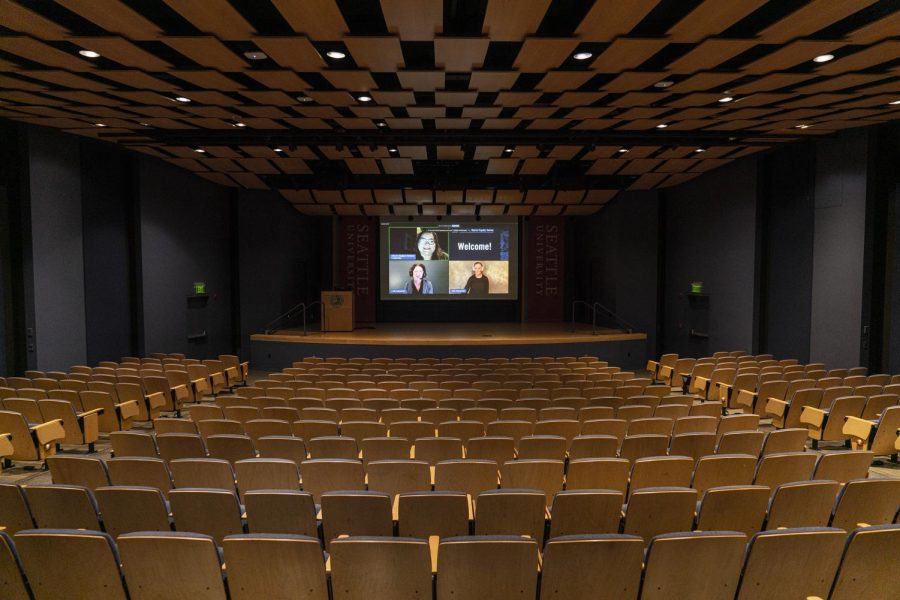Why Don’t Students Go To Events?
Empty seats of Pigot auditorium during the LaTosha Brown talk held virtually and in person.
With organizations on campus such as the Office of Multicultural Affairs (OMA), Wellness and Health Promotion (WHP), Campus Ministry and numerous student-run clubs, there is almost always some sort of activity or event going on. Yet, the day-to-day schedules of students at Seattle University tend to fill up quickly, so it might be difficult to find the time to attend on-campus events. Given that it’s the middle of winter and the quarter will be over in a few short weeks, students are likely feeling overwhelmed by their upcoming assignments and final papers.
Ashlee Day, assistant director at OMA, mentioned the difficulty of advertisement and the overlapping schedules of their events with students as well as a general lack of motivation as obstacles clubs face in motivating student attendance.
“Marketing is the hardest part about trying to get students at events…We know that students already get so many emails or may not want to follow a campus office on Instagram, so it can be hard to get the word out about things. Also, finding time to host events can be hard,” Day said. “People are so busy with classes, work, friends and family. It’s rare that events aren’t overlapping from different offices and clubs also because there are so many people planning things on a regular basis.”
Recently, OMA events have only had a handful of students in attendance. As they spend a great deal of time in the office brainstorming solutions and strategies to increase student involvement, Day explained that collaborating with other offices has had a positive impact because it allows for more networking with the student population. BIPOC lunches are hosted and coordinated with Campus Ministry and have better student attendance than their other events. Having two offices advertising instead of one can make all the difference.
Isabelle Fong, a first-year pre-major student, expressed that she finds it difficult to find events and she is often too busy to attend.
“Most of the time, I don’t attend because I have a conflicting schedule… I also feel like I find out about events too late, and that advertising should begin more in advance so that people can work out their schedule for events that they really want to attend,” Fong said.
Working students often have more rigorous schedules than those who are able to only focus on classes. While balancing homework loads between classes can be difficult, having a job adds another unique challenge that can also increase exhaustion.
WHP has been hosting a number of events throughout February all under the banner of Love Month. The events focus on sexual and personal wellness. Chris Fiorello, director of WHP, said that the events have had a wide range of attendance from more than 100 students to fewer than ten students stopping by. He talked about some of the patterns he has seen in students and what piques students’ interest as well as what potentially makes them hesitant to attend.
“I think where the challenge lies is that if you offer students things that students need, [such as] events to help with depression, anxiety and loneliness… there’s this feeling of ‘Ugh. Another self-care workshop. I don’t think I can do another person telling me how to take care of myself.’ But what we found is that if we are able to give people free stuff—feed them a little with comfort food—that increases reception to the messages that we are offering that are educational and supportive,” Fiorello said.
Fiorello feels that when food is added into the equation of entering a room full of new people, it has the ability to ease nerves since eating with others over casual conversation is a force that brings people together. Being able to indulge in a tasty snack while tackling uneasy topics can make it feel slightly easier to cross thresholds.
Even if someone sees an event and is intrigued about potentially attending, it’s the point in the quarter where finding time to interact with others at a workshop or lunch may seem impossible due to a combination of an intense workload and the stress of time management.











